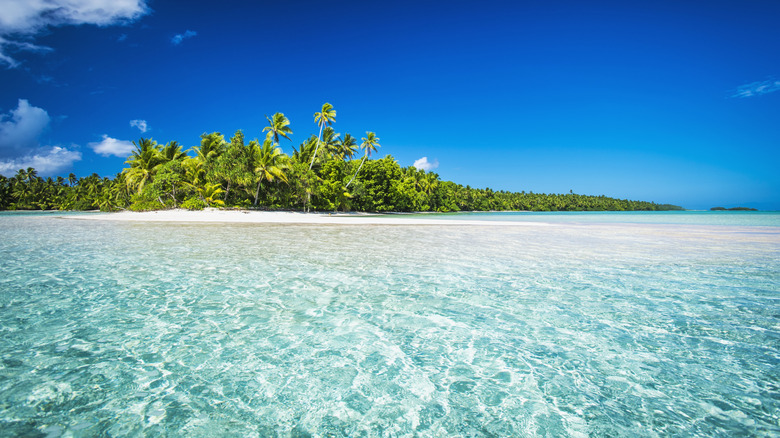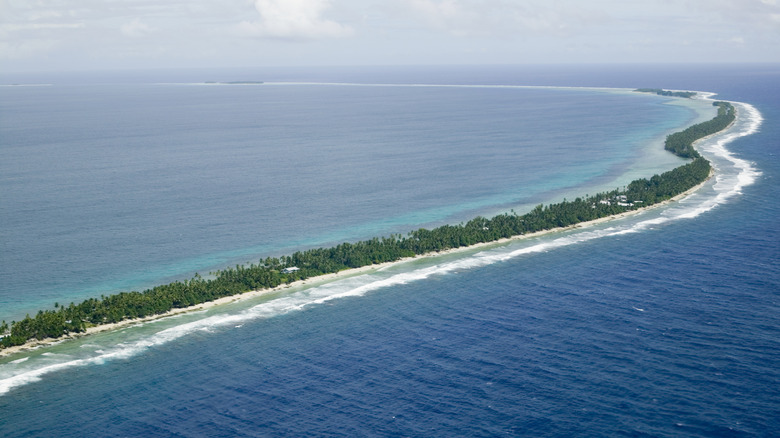One Of The World's Least-Visited Countries Is A Tropical Island Paradise That's Like A Mini Fiji
When we think of the South Pacific, vivid images of white sand beaches, azure waters, and palm trees blowing in the breeze may spring to mind. This vast stretch of ocean is home to some of the most idyllic spots on the planet, including top-rated island destinations in Fiji and beautiful Polynesian islands that are the perfect addition to your bucket list.
The famous islands within this part of the world attract sun and sea lovers from around the globe for a very good reason: they are all slices of heaven on Earth. That said, the popular destinations are hardly the region's only options. Anyone willing to look a bit deeper will find a treasure trove of under-the-radar South Pacific havens to choose from. Among these is Tuvalu, an out-of-the-way gem lying over 700 miles north of Fiji that is among the least-visited countries in the world.
The tiny atolls and reef islands that make up Tuvalu are known for their pristine beaches, tranquil lagoons, underwater reef life, and overall tropical perfection. Tuvalu's isolation also means that it has avoided the clutch of mass tourism. While the islands offer plenty of comfortable accommodations, there are no big resorts, guaranteeing visitors a more intimate and culturally enriching experience than they may get elsewhere.
Experience sun-splashed splendor amidst the coral and palms in Tuvalu
Home to just under 10,000 residents, Tuvalu is among the top 10 least populated countries on earth, according to World Population Review. Around half of the country lives in the capital, Funafuti, which is one of the nine islands that make up this sovereign Polynesian nation. These slender landmasses only add up to 9.7 square miles of total land area, stretching across about 420 miles of the South Pacific Ocean.
While the main islands are fun to explore on foot or on the back of a small motorbike, the sea is the name of the game in Tuvalu. There are seven great beaches in Funafuti Atoll, perfect for swimming and relaxation. The snorkeling and diving offered here is also off-the-charts, though there are no local dive shops. The western side of the atoll lies within the 12.7-square-mile Funafuti Conservation Area, which contains coral reefs, lagoons, islets, and wildlife like clams and plenty of tropical fish. The area is also home to a population of endangered green turtles, which nest in the sands. For those more interested in life above the waves, the reserve also hosts a breeding colony of black noddy seabirds and crested terns.
While most visitors center themselves in Funafuti, it's possible for adventurous travelers to visit some of the archipelago's more far-flung islands, such as Nanumea, Vaitupu, Nukufetau, and Nui. These islands are all served by boats, though it is also possible to fly.
Tuvalu's intimate island culture
Like other remote South Pacific destinations (such as Yap, an underrated, tourist-friendly island in Micronesia ideal for a serene tropical escape), the fact Tuvalu is so hard to get to has proved to be a blessing. Life goes on as it has for generations in the villages that dot the archipelago, and the easy-going locals are known for their open and friendly demeanor. The small amount of tourism the country does get helps the local economy without overwhelming the local way of life.
Most accommodations in Tuvalu are family-run lodges and guesthouses, meaning visitors can make personal connections with their hosts during their visit. You may be invited to accompany your hosts to church, enjoy a hearty family meal of fresh fruit and fish, or even witness a performance of the time-honored Polynesian dance song, fatele. Visitors who arrive in Tuvalu with open minds and hearts will be treated to the kind of non-transactional experiences that are so rare in this age of travel.


